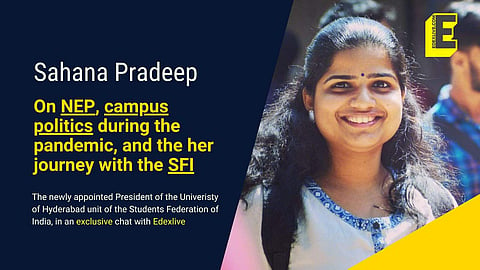

The Students' Federation of India’s University of Hyderabad unit appointed a new president last week. Sahana Pradeep is a 29-year-old PhD scholar who joined UoH in 2018 for Translation Studies. Back home in Kerala, Sahana had finished her graduation and postgraduation from St Joseph’s College and her MPhil in Literature from Calicut University. And while she officially joined the SFI while at St Joseph’s, her tryst with the organisation began way back during her school days where she observed students dropping out of public schools citing lack of textbooks and infrastructure, which the government was failing to provide. “Within that space, the SFI was aggressively addressing these issues and trying to distribute textbooks at their organisation’s capacity. They also organised awareness campaigns in the villages, speaking with the rural people and asking them to enrol their kids in school,” recalls Sahana.
Excerpts from a chat:
1. What pull did SFI have for you as a young student in Kerala?
The need to make public education accessible has always been the agenda and to resist privatisation of education. The effort that the government was putting into developing public schools and colleges to improve infrastructure of academic spaces was not being followed up by parties that came to power. For us, it is a roller coaster time when the shift happens in the political space, to constantly address and follow up on these issues.
2. How has your experience at SFI UoH been?
Despite being a central university, the condition of the hostels, schools and infrastructure provided to us here is quite pathetic. A large section of students come from economically disadvantaged sections of society. For them, exposure to knowledge is an equal right. They also have equal rights to access good infrastructure as their peers from upper class and upper caste backgrounds. That challenge is quite important here. We meet people regularly, we speak with them, connect with and support their issues. In August 2019, in the North campus ladies hostels, we called for a protest, organising all women students to highlight the condition of these hostels. There has been severe negligence from the administration towards the hostels. They weren’t maintained properly, lack sanitation and water facilities and the condition of the washrooms was pathetic. The protest was quite successful. We got assurance that this issue would be addressed within reasonable time and most of the issues were addressed. Whenever there are issues that a lot of students face, we try to bring them to a common platform and mobilise and organise them.
3. How hard is it to manage student politics and keep it alive during a pandemic remotely?
It has been really tough. When students are not on campus, they try to resolve issues at an individual level. Getting students back to campus and reinstating the organisation is the main focus right now. Most of our members are not from elite backgrounds and have limited access to online education. Having regular meetings and talking to them is very difficult. That is almost missing. Having them on campus and co-ordinating with them is important. It is through members that we connect with students from different departments. As a student of Translation, I can reach out only to students from the department of languages. Having that network back in place again is the key to understanding and addressing issues. Student union elections last happened in September 2019. We are in an advanced state of student return. Once one-third of the students are back on campus, the discussion regarding the elections may start.
4. What, according to you, have been the biggest gains through the years for SFI?
Resisting privatisation of education was the most important achievement of SFI. I am from Kerala and one of the Congress governments tried to privatise polytechnic colleges in the state. SFI came in and the Kerala state committee took up the issue and resisted the move. And to date, the sector is not privatised. Similarly in Hyderabad Central University, over the years, there have been attempts to introduce graded autonomy, which will provide the university with financial autonomy. And when the university gets financial autonomy, the burden of raising funds falls on its own shoulders and that will eventually force the university to introduce private courses and increase the fees. We have been protesting like anything, including an aggressive protest in 2019. Recently, there were attempts to implement NEP, which does not talk about reservation, campus democracy, student unions or gender sensitisation programmes.
5. What bones does the SFI have to pick with the NEP?
There are too many issues with the NEP. Apart from the proposals with regards to privatisation of education, the integrated courses that allow students to take gap years is a very drastic thing. If you allow certificates at different levels for the same course based on when a student chooses to end it, it will adversely affect girl students. It legitimises dropping out. Even if you do not complete graduation and drop out in your second year, you will still get a diploma. So, for families that are orthodox, who aren’t keen on girls getting an education and students who are not socio-economically well-off, dropping out is legitimised. That’s the NEP’s focus, rather than providing free or subsidised education.
6. What are your personal goals?
I am interested in academics. I was teaching before pursuing my PhD. I believe that the ideology I follow can be disseminated through the teaching platform too. If I get a chance, I would prefer to join academics.
